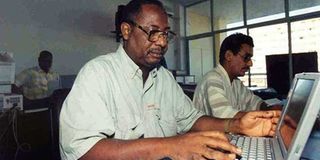Jammeh ordered Gambian journalist’s killing, army officer says

AFP correspondent in Gambia Deyda Hydara (front) in a photo taken on November 10, 1999. A Gambian army officer on July 22, 2019 accused ex-President Yahya Jammeh of ordering the 2004 murder of Hydara and said he was one of three involved in the killing, according to his testimony to a truth commission. PHOTO | SEYLLOU | AFP
A Gambian army officer on Monday accused ex-president Yahya Jammeh of ordering the 2004 murder of journalist Deyda Hydara and admitted he was involved in the killing.
Hydara, who was editor and co-founder of the independent daily The Point and a correspondent for AFP and Journalists without Borders (RSF), was killed by unidentified gunmen in his car on the outskirts of the Gambian capital Banjul in December 2004.
The murder was widely condemned locally and abroad as another sign of Mr Jammeh’s despotic rule and his stifling of all opposition in the former British colony.
PULLED TRIGGER
Lieutenant Malick Jatta said at the public hearing before Gambia’s Truth, Reconciliation and Reparations Commission that he was among three people who pulled the trigger.
“We opened fire, myself, Alieu Jen and Sana Manjang,” said Mr Jatta, naming two other military officers in Mr Hydara’s killing.
“Our commander, Captain Tumbul Tamba, was communicating to the former president, Yahya Jammeh, on the phone during the operation. He was saying to him, ‘Yes Sir, Your Excellency,’” he added.
ENVELOPE
Mr Jatta told the commission that his commanding officer later gave him an envelope containing dollars, which he said was a “sign of appreciation from the big man”, a reference to Mr Jammeh.
“I would be certain that it was from the former president. Tumbul had no source of dollars,” he said.
Mr Jatta noted that one of the cars used during the assassination was from Mr Jammeh’s fleet and that it was normally parked in the strongman’s former garage in Kanifing outside Banjul.
Mr Jammeh had said in an interview on Gambian state television that the government had “no stake” in the killing. He had hinted that Hydara’s love life had led to the murder.
CAMPAIGN
In 2017, NGOs and families of victims killed during Mr Jammeh’s rule, including Mr Hydara’s son, launched an international campaign aimed at bringing the former despot to justice.
Mr Pap Babucarr Saine, Mr Hydara’s colleague and managing editor of The Point, told the truth commission earlier that Mr Hydara was killed for writing about the rampant corruption that marked Mr Jammeh’s rule.
“He was always sensitising the populace on the corrupt practices of the regime as well as the rights violations that were taking place at the time,” local newspapers quoted him as saying.
Monday’s admission by the lieutenant drew a prompt from the Committee to Protect Journalists (CPJ), which demanded trial of the ex-president.
CPJ’s Africa Programme Coordinator Angela Quintal revisited the efforts to get justice for the slain journalist.
JUSTICE FOR HYDARA
“For 15 years, CPJ has called on Gambian authorities to do everything in their power to ensure those who carried out Deyda Hydara's killing are brought to justice. Today, Yahya Jammeh himself was accused of giving the order to kill a respected journalist,” Ms Quintal said.
“Jammeh should be extradited (from Equatorial Guinea) to Gambia without delay to stand trial for the murder of Hydara and other abuses carried out during his rule,” she added.
Mr Jammeh seized power in a bloodless coup in 1994 and ruled with an iron fist for 22 years.
His refusal to leave power after losing a presidential election sparked a regional crisis in West Africa, which ended when he agreed to live in exile in Equatorial Guinea.
Gambia’s Truth, Reconciliation and Reparations Commission, a body with the support of the United Nations, was set up in October to investigate alleged abuses during Mr Jammeh’s reign.
-Additional reporting by Nation reporter Elvis Ondieki and Reporters without Borders




